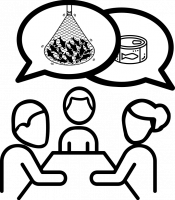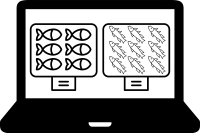The stakeholder dialogue was implemented in Scotland by the JHI, and in Germany by ISUN. As for Scotland, the stakeholders are scattered all around the country, with most of them based in the North-East, where the JHI is also based and which is the main fishing region of the country.
Most of the efforts were devoted to engaging stakeholders through emails, phone calls and in-person visits to their premises. Hundreds of stakeholders were contacted along the entire fish supply chain, from fishing companies to retailers and fishmongers. If some of them express an interest in joining the dialogue, an informal chat was followed by an hour-long interview and an initial questionnaire to assess their baseline situation in terms of waste generation, prevention and awareness. Overall, 21 stakeholders were interviewed. Those who joined the dialogue were invited to networking events. The Scottish Skipper Expo was a great opportunity to contact stakeholders with limited representation such as fishmongers and primary processors. The results of the interviews were used to produce a report with policy recommendations.
In the case of Germany, numerous expert interviews were conducted to detect the hotspots for food losses and waste in the fish value chain in the country. Based on the interviews, a focus group discussion was conducted in Bremen to find approaches for reducing food loss and waste in the German fish value chain. Participants discussed different theses and tried to find solutions on different levels regarding fish waste. Various market segments were represented at the meeting: association of fish industry and wholesale, fish producer, fish wholesaler, system gastronomy with a focus on fish, surplus exchange provider (Leroma), lender for the fishing sector and NGO.
It is worth noting that there is no such thing as waste in the fish supply chain – apart from when consumers throw away their fish – but it is rather an issue of allocating the products to the best potential use along the waste pyramid, to ensure that the most value (and benefit) is obtained from the economic and natural resources embedded in the products.

